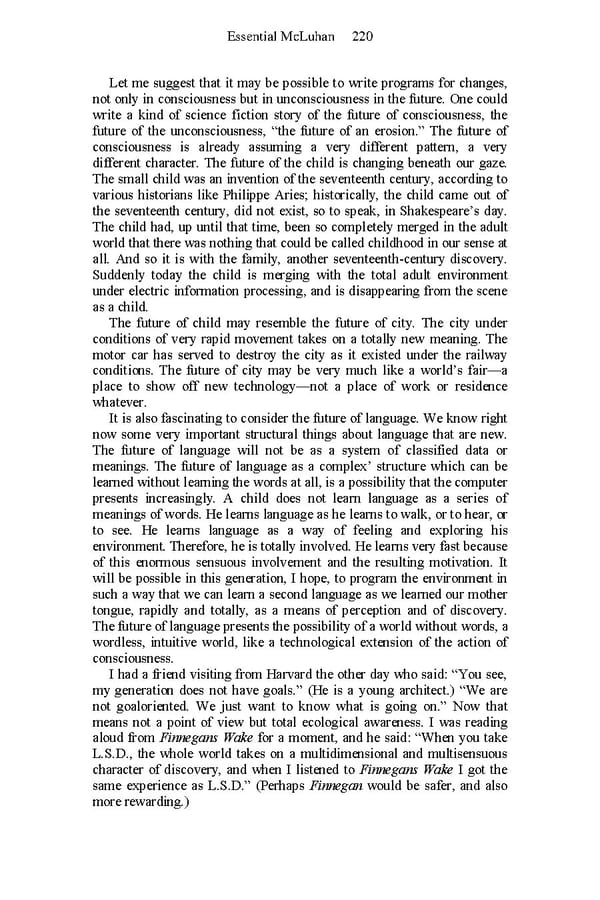Essential McLuhan 220 Let me suggest that it may be possible to write programs for changes, not only in consciousness but in unconsciousness in the future. One could write a kind of science fiction story of the future of consciousness, the future of the unconsciousness, “the future of an erosion.” The future of consciousness is already assuming a very different pattern, a very different character. The future of the child is changing beneath our gaze. The small child was an invention of the seventeenth century, according to various historians like Philippe Aries; historically, the child came out of the seventeenth century, did not exist, so to speak, in Shakespeare’s day. The child had, up until that time, been so completely merged in the adult world that there was nothing that could be called childhood in our sense at all. And so it is with the family, another seventeenth-century discovery. Suddenly today the child is merging with the total adult environment under electric information processing, and is disappearing from the scene as a child. The future of child may resemble the future of city. The city under conditions of very rapid movement takes on a totally new meaning. The motor car has served to destroy the city as it existed under the railway conditions. The future of city may be very much like a world’s fair—a place to show off new technology—not a place of work or residence whatever. It is also fascinating to consider the future of language. We know right now some very important structural things about language that are new. The future of language will not be as a system of classified data or meanings. The future of language as a complex’ structure which can be learned without learning the words at all, is a possibility that the computer presents increasingly. A child does not learn language as a series of meanings of words. He learns language as he learns to walk, or to hear, or to see. He learns language as a way of feeling and exploring his environment. Therefore, he is totally involved. He learns very fast because of this enormous sensuous involvement and the resulting motivation. It will be possible in this generation, I hope, to program the environment in such a way that we can learn a second language as we learned our mother tongue, rapidly and totally, as a means of perception and of discovery. The future of language presents the possibility of a world without words, a wordless, intuitive world, like a technological extension of the action of consciousness. I had a friend visiting from Harvard the other day who said: “You see, my generation does not have goals.” (He is a young architect.) “We are not goaloriented. We just want to know what is going on.” Now that means not a point of view but total ecological awareness. I was reading aloud from Finnegans Wake for a moment, and he said: “When you take L.S.D., the whole world takes on a multidimensional and multisensuous character of discovery, and when I listened to Finnegans Wake I got the same experience as L.S.D.” (Perhaps Finnegan would be safer, and also more rewarding.)
 Essential McLuhan Page 226 Page 228
Essential McLuhan Page 226 Page 228